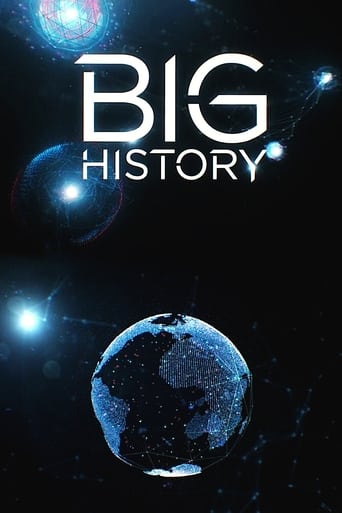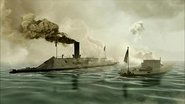
Rating:
7.8/10 by 5 users
Big History (2013)
Explores many facets of epic moments in history from the past 13.7 billion years, from a Big History perspective.
Writing:
Release Date:
Sat, Nov 02, 2013
Country: US
Language: En
Runtime: 30
Country: US
Language: En
Runtime: 30
Bryan Cranston
Narrator
Season 1:

We all know that mankind can't live without air, food and water...the same is true of salt. The salt on your table is a key to unlocking the story of our planet and the cosmos. Big History reveals how this simple molecule underpins our civilization, launched wars, built monuments like the Great Wall of China, sparked revolutions from India to France...and it's even the substance that makes up our thoughts.

The horse has been a revolutionary animal in unexpected ways. It has changed how we speak, what we wear, and sets the hidden limit for the size of our most massive empires. It's a story that spans the cosmos, from the Big Bang, to the Sun, to a changing planet that turned the horse into man's best friend in the animal kingdom.

This episode asks why mankind is gold crazy, and discovers there's a hard-wired reason we lust after it, and a microscopic explanation for why it shines. We reveal how the science behind our favorite metal drives men across oceans and continents, and how a difference in the way it's used in each hemisphere leads to a clash of civilizations.

Reveals how cold has the power to turn men into Barbarians, spark history's longest running war, and create the concept of race. After the heat of the Big Bang, cold creates the Universe and the planet as we know it. For thousands of years on Earth, cold controls the fate of our species by changing our bodies, our skin, and even the metals we use to fight our wars. When we finally take control of the cold, we learn to dominate the planet.

From the Great Pyramid at Giza to the towering skyscrapers of today, humans have engineered massive constructions for at least 5,000 years. But why? How do biology and human emotions affect our desire to build gigantic structures? Why were the earliest mega-structures almost always pyramids? Why do people have the urge to build tall, and how do mega-structures on earth echo a basic principle embedded in the very structure of the universe?

Flight takes more than wings. We need the right kind of air, the perfect materials cooked up over billions of years, and cosmic forces that are just right for us to leave the ground without tumbling off into space. Big History reveals how planet Earth is the perfect planet for flight.

Behind that cup of coffee or tea is a global story that goes back to the collision that created the Moon and the evolution of plant and animal life. The key is the molecule that gives your morning cup its kick: caffeine, the most popular drug in history. This is the story of how a plant poison became our drug of choice, and stimulated revolutions around the planet.

Humans have small teeth and no claws or armor, so how do we project our power? Warfare has defined traditional history, but Big History digs deeper to reveal how it all began. We see how bat poop and ancient trees shaped the history of weapons, and link the gun all the way back to a change in our bodies that turned us into throwing machines.

They form natural boundaries, dictate how we spread around the planet, create natural defenses, and control our weather. From the World War that began with a gunshot in the Balkans to the feuds of the Appalachians, mountains have also been flashpoints for violence. They provide minerals and metals that make civilization possible, and the water that feeds billions, yet we were never designed to live in their extreme environments. Without mountains earth would be desolate and uninhabitable, and scientists now believe that an invisible mountain range made life possible ...

How does the cellphone in your pocket link to the Big Bang, the evolution of human memory, and even the Titanic disaster? Big History reveals how cosmic forces conspired to give us the tool that has revolutionized the planet. From the dial pad to the way we write phone numbers, there's a hidden science behind the cellphone.

Secret codes run the world. The code of life, DNA, is the operating system for all organisms, which spawned intelligent life like us who eventually created codes of our own--language that allows us to talk and the alphabet that lets us write. We've even created an entire digital universe built of binary code that powers the machinery of the modern age. But is it possible that the universe itself runs on code?

Impacts from space have created our planet and just about everything in it. Like celestial supply ships, they brought in water, metal, and maybe even life. They made our moon and sculpted the geography of our planet, but just as they created everything we know, they will likely snuff it all out in a fiery burst of destruction.

The Sun is our master and creator. It gives us our perception of time, controls our reality, and powers our lives. Big History sheds new light on our nearest star, revealing that ancient sun worship intersects with science, that our bodies are fine-tuned to the 24-hour day, and history is driven in unseen ways by the simple way we circle our star.

Eating meat made us human...by giving us bigger brains, better tools, and spoken language. The human need for beef has driven history across the hemispheres, but how did we turn an ancient mega-beast into the cow we have today? Big History traces all the beef on earth back to a single prehistoric herd.

Water is the miracle molecule, and mankind has used its perfect properties to revolutionize our lives. It was our first superhighway, the lifeblood of civilization, and gives us 90% of all the power we use today. This episode reveals how the science behind water is the driving force behind history.

At critical moments in history, our second place metal was the most important metal on Earth. Big History reveals how silver's place in our minds was determined by the heat of exploding stars, and how this one metal saved democracy, gave us the dollar, and had a secret power to connect the world.

A two-hour special that caps off the 16-episode first season of H2's "Big History", the program illustrates the eight major "thresholds" or turning points that have made our universe and life on our planet possible.


